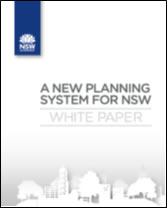|
Attracting institutional investment into affordable rental housing |
Acclaimed by AHURI CEO Ian Winter as ‘a terrific contribution... to national policy development’ and ‘noted with interest’ by Commonwealth, State and Territory Housing Ministers at their last meeting, reports from the CF-led Investigative Panel on facilitating institutional investment in rental housing were published in March 2013.
 Convened and managed by Associate Professor Vivienne Milligan, the Panel brought together experts from the financial sector, the housing industry and community agencies. Its brief was to advise government on how to encourage financial institutions (e.g. super funds) to invest in supplying additional rental housing, especially at the affordable end of the market. The Panel found that with strong government leadership and long-term commitment large scale institutional investment in rental housing is both desirable and feasible. A detailed strategy for the development of a new residential asset class was recommended. Convened and managed by Associate Professor Vivienne Milligan, the Panel brought together experts from the financial sector, the housing industry and community agencies. Its brief was to advise government on how to encourage financial institutions (e.g. super funds) to invest in supplying additional rental housing, especially at the affordable end of the market. The Panel found that with strong government leadership and long-term commitment large scale institutional investment in rental housing is both desirable and feasible. A detailed strategy for the development of a new residential asset class was recommended.
In addressing the widely acknowledged need to diversify sources of rental investment finance beyond ‘mum and dad investors’, the Panel reports lie close to the cutting edge of current housing policy debates. Those requesting presentations on Panel findings have so far included the NSW Treasury, the ACTU, the Committee for Sydney, Queensland Shelter and the Community Housing Federation of Australia.
Reflecting the strong parallels with recent policy interest in the UK, an international comparative paper drawing on the investigative panel report was presented by Hal Pawson and Vivienne Milligan at the recent Housing Studies Association conference. City Futures is also contributing to a follow-up RMIT university-led study on social housing guarantees also being funded by AHURI Ltd. |
|
CF Welcomes Jennifer Kent |
The City Futures Healthy Built Environments Program (HBEP) welcomes its new Research Associate, Jennifer Kent. Previously an HBEP casual staff member within the team and lead author of the team’s award-winning Literature Review, Jennifer recently submitted her PhD thesis Secured by automobility: why does the private car continue to dominate transport practices? |

|
Read Bill Randolph’s comments on Sydney’s inner city revival, on the case for a second Sydney airport at Badgery’s Creek, and the importance of state-imposed housebuilding targets as reported in the Sydney Morning Herald. And Hal Pawson’s assessment of fixed term tenancies in public housing (The Age). See also Vivienne Milligan’s recommendations on how government should entice institutions to invest in rental housing (Australian Financial Review) and details of Hazel Easthope’s newly initiated research on the rise of multi-generational living in Australia’s cities (The Australian). |
|
NSW Government recognises health as a legitimate landuse planning objective |
April 2013 saw the publication of the NSW Government’s long-awaited White Paper heralding major planning system reforms. CFRC has already made several submissions to the NSW Government as it undertakes this first comprehensive review of the State’s Planning System in over 30 years. In particular, the Healthy Built Environments Program has lobbied hard for inclusion of ‘health’ as an explicit objective of landuse planning policy. It is therefore gratifying that the draft NSW Planning Act includes the promotion of health as one of eight principal objectives. Comments on the White Paper and draft legislation, are now invited from stakeholders and the public, with many briefings, feedback sessions and meetings being held across the state.
|  |
|
HBEP literature review informs Sydney’s draft metro strategy |
The recently published draft Metropolitan Strategy for Sydney 2031 is now open for comment. In addressing liveable city aspirations, the strategy draws on data collated and analysed in the City Futures HBEP publication ‘Healthy Built Environments: A Review of the Literature’. This is one of a series of key government documents using the literature review to inform reporting and plan making. |
|
Social connection across the generations |
HBEP Director, Associate Professor Susan Thompson, recently featured in a UNSW TV video on the importance of fostering social connections across generations. Depicting the relationship between the children of Tigger’s Honeypot, a UNSW child care centre, and residents of Milford House, an aged care facility in nearby Randwick, the video illustrates the multiple well-being benefits both groups gained from regular interactions and friendships that developed over time.
|

|
|
Forthcoming BE/City Futures Seminars |
Dr. Ilan Wiesel (City Futures) - '"Knockdown-Rebuild” in suburban Sydney: renewal, reproduction, McMansionisation'
May 29, 12pm.
UNSW-Red Centre West Wing. Room TBC |
 |
Prof. Hal Pawson & A/Prof Vivienne Milligan (City Futures) - 'Golden dawn or chimera? Can institutional investment transform rental housing?'
June 13, 12pm. UNSW-Red Centre West Wing. Room 4035 |
  |
Prof. David Gordon (Queen’s School of Urban and Regional Planning) - 'Canadian Urbanism from Coast to Coast'
June 27, 12pm. UNSW-Red Centre West Wing. Room 4035 |
 |
Dr. Judith Stubbs (CF Adjunct Senior Lecturer) - 'Can We Go Much Further? Delivering ‘Affordable Housing’ in Outer Perth and Sydney'
August 7, 12pm.UNSW-Red Centre West Wing. Room 4035 |
 |
|
Understanding Canadian planning participation
|
 April 2013 saw City Futures hosting Dr Ann McAfee, former co-Director for Planning for the City of Vancouver. In this guise Ann led the extensive public consultation underpinning Vancouver’s celebrated "CityPlan". Ann’s Australian itinerary included the sold out one-day professional planning workshop held on April 10 which attracted professionals from across NSW and Victoria. She also presented at the NSW Department of Planning and at the Melbourne-based panel event which included distinguished speakers from Victoria’s planning and design community. The visit concluded with Ann’s participation in the one-day academic symposium arranged by CFRC’s Dr Crystal Legacy, titled “Tools for Change: how planning implementation tools can deliver equitable urban intensification outcomes” which attracted academics and practitioners from across Australia and North America. After this exciting week of discussions on planning and the future of our cities we would like to thank Ann for her stimulating presentations which can be found on the City Futures website. April 2013 saw City Futures hosting Dr Ann McAfee, former co-Director for Planning for the City of Vancouver. In this guise Ann led the extensive public consultation underpinning Vancouver’s celebrated "CityPlan". Ann’s Australian itinerary included the sold out one-day professional planning workshop held on April 10 which attracted professionals from across NSW and Victoria. She also presented at the NSW Department of Planning and at the Melbourne-based panel event which included distinguished speakers from Victoria’s planning and design community. The visit concluded with Ann’s participation in the one-day academic symposium arranged by CFRC’s Dr Crystal Legacy, titled “Tools for Change: how planning implementation tools can deliver equitable urban intensification outcomes” which attracted academics and practitioners from across Australia and North America. After this exciting week of discussions on planning and the future of our cities we would like to thank Ann for her stimulating presentations which can be found on the City Futures website.
|
Don’t forget the two-yearly State of Australian Cities (SOAC) conference being held at the Shangri La hotel, Sydney 26-29 November 2013. Ten years on from its inauguration, the SOAC series is now established as the leading event on Australian urban research, at which the practitioner and academic research communities meet to exchange ideas and to network. In the process, the conference has grown from an initial attendance of around 200 to reach 350 at Melbourne in 2011. |
|
City Futures Publications: Books,
Refereed Journal Articles, AHURI Reports and other Q1 2013 |
Bridge, C., & Riazi, A. (2013). Potential Environmental Hazard: From Perspectives of People with Central Vision Loss Who Reside in Sydney Independent Living (Vol. 29, pp. 16-21). Independent Living Centre, NSW. |
Fitzpatrick, S., & Pawson, H. (2013). Ending security of tenure for social renters: Transitioning to ‘ambulance service’ social housing? Housing Studies (forthcoming as an Ifirst paper). |
Legacy, C., & Whitzman, C. (2013). Women and planning: Building Inclusive Cities Planning News (NSW) (Vol. 94 (March 2013), pp. 17). |
Liu, E., & Easthope, H. (2013). Multigenerational households in Australia: Some interesting facts The Quarterly Magazine (Vol. 13, pp. 22-23). Queensland Shelter. |
Liu, E., & Easthope, H. (2013). Multigenerational households on the rise Around the house (pp. 12-13). Shelter NSW. |
Milligan, V., Hulse, K., & Davison, G. (2013). Understanding leadership, strategy and organisational dynamics in the not-for-profit housing sector. Melbourne, Australia: Australian Housing and Uban Research Institute. |
Milligan, V., Yates, J., Vizel, I., Pawson, H., & Hamilton, C. (2013). Financing rental housing through institutional investment: outcomes of an investigative panel AHURI Final Report No. 202 (Vol. 1). Melbourne: Australian Housing and Urban Research Institute. |
Milligan, V., Yates, J., Vizel, I., Pawson, H., & Hamilton, C. (2013). Financing rental housing through institutional investment: supplementary papers AHURI Final Report No. 202 (Vol. 2). Melbourne: Australian Housing and Urban Research Institute. |
| Mouat, C., Legacy, C., & March, A. (2013). The Problem is the Solution: Testing agonistic theory’s potential to explain intractable planning disputes. Urban Policy and Research. |
Pawson, H., & Wilcox, S. (2013). UK Housing Review 2013. Coventry: Chartered Institute of Housing.
|
Walls, R., Millikan, L., Bridge, C., & Davy, L. (2013). Home Modifications in Aboriginal Housing Occasional paper. UNSW: The Home Modification Information Clearinghouse. www.homemods.info |
Wiesel, I., Freestone, R., & Randolph, B. (2013). Owner-Driven Suburban Renewal: Motivations, Risks and Strategies in ‘Knockdown and Rebuild’ Processes in Sydney, Australia. Housing Studies. |
| Wiesel, I., Pinnegar, S., & Freestone, R. (2013). Supersized Australian Dream: Investment, Lifestyle and Neighbourhood Perceptions among “Knockdown-Rebuild” Owners in Sydney. Housing, Theory and Society, 1-18. |
Wiesel, I. (2013). Housing people with intellectual disability under the National Disability Insurance Scheme. In C. Bigby & C. Fyffe (Eds.), Making mainstream services accessible and responsive to people with intellectual disability: what is the equivalent of lifts and Labradors? (pp. 47-53). Seventh Annual Roundtable on Intellectual Disability Policy: Melbourne: La Trobe University. |
For a full list of CF publications see the City Futures website
|
You have received this newsletter because you have previously communicated an interest in City
Futures news. We are currently in the process of updating our mailing list, so if you have recently asked us not to send you any newsletters, please accept our apologies.
Any suggestions or feedback you may have on our newsletter would be greatly appreciated, so please feel free to contact us at cityfutures.contact@unsw.edu.au
 Follow us on Twitter!
Follow us on Twitter!
|



